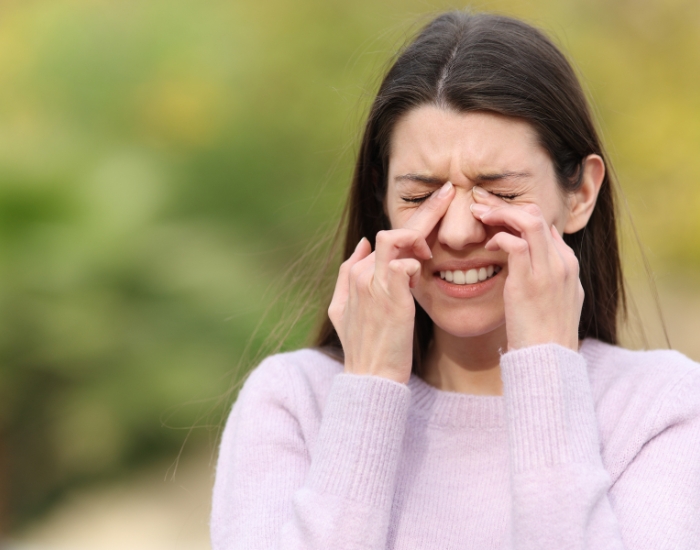If constant sneezing and itchy eyes are making your daily life uncomfortable, you’re not alone. These symptoms are common, but they can significantly affect your quality of life. While they are often associated with seasonal allergies, there are other potential causes that might surprise you. Let’s explore the common culprits, effective remedies, and why it’s crucial to address these symptoms.

Understanding the Symptoms
Sneezing: Sneezing is your body’s natural way of expelling irritants from your nose. If it’s constant, it might indicate an ongoing reaction to allergens or other environmental triggers.
Itchy Eyes: This uncomfortable sensation often accompanies sneezing, especially during allergy season. It occurs due to inflammation in response to irritants, which may range from pollen to pet dander.
These symptoms can disrupt your focus, cause fatigue, and even lead to secondary issues such as sinus infections if not addressed. Visit our primary clinic in Sugar Land for same day treatment.
Common Causes of Constant Sneezing and Itchy Eyes
- Seasonal Allergies (Hay Fever): Allergies to pollen from trees, grasses, or weeds are the most common cause of sneezing and itchy eyes. Symptoms usually peak during specific times of the year depending on your location.
- Indoor Allergens: Dust mites, mold, and pet dander can trigger symptoms year-round, particularly in poorly ventilated spaces.
- Non-Allergic Rhinitis: Certain irritants like cigarette smoke, strong odors, or changes in weather can cause similar symptoms without an allergic component.
- Viral Infections: Sneezing and itchy eyes might also be early signs of a cold or flu, though these symptoms typically resolve within a week.
- Eye Strain and Dryness: Prolonged screen time or environmental dryness can mimic allergy-like symptoms, causing eye discomfort.
Effective Remedies for Symptom Relief
Lifestyle Adjustments:
- Reduce Exposure to Triggers: Use air purifiers and keep windows closed during high-pollen seasons.
- Maintain Cleanliness: Regularly clean your living spaces, especially bedding and carpets, to minimize dust and pet dander.
Over-the-Counter Options:
- Antihistamines: Medications like loratadine or cetirizine can reduce sneezing and itching.
- Nasal Sprays: Saline sprays help clear irritants, while steroid sprays like fluticasone reduce inflammation.
Natural Remedies:
- Cold Compress: Placing a cool, damp cloth over your eyes can provide instant relief.
- Steam Inhalation: This can ease nasal congestion and soothe irritated nasal passages.
Consult a Specialist: If symptoms persist, consider allergy testing to pinpoint specific triggers. Immunotherapy, or allergy shots, might offer long-term relief for severe cases. Or you can take necessary flu vaccines for precaustions.
When to Seek Medical Attention
Persistent sneezing and itchy eyes may indicate a more serious condition. Consider consulting a healthcare professional if:
- Symptoms last longer than two weeks and do not improve with over-the-counter remedies.
- You experience additional symptoms such as fever, severe headache, or difficulty breathing.
- Your daily activities or sleep are significantly disrupted.
At Lifetime Primary Care, our experienced physicians specialize in diagnosing and managing allergy-related conditions. We use advanced diagnostic tools to create personalized care plans tailored to your needs.
Final Thoughts
Constant sneezing and itchy eyes can be frustrating and disruptive, but relief is possible. By identifying the underlying cause and adopting the right strategies, you can reclaim your comfort and well-being. Don’t ignore persistent symptoms, as they might lead to complications if left untreated. Take proactive steps to address your health today.
For expert care and a personalized treatment plan, contact Lifetime Primary Care. Let us help you find lasting relief and improve your quality of life.
Disclaimer: The information provided in this blog is for educational purposes only and is not intended as medical advice. It should not be used to diagnose or treat any health condition. Always consult with a qualified healthcare professional for accurate diagnosis and treatment of any symptoms or medical concerns.



